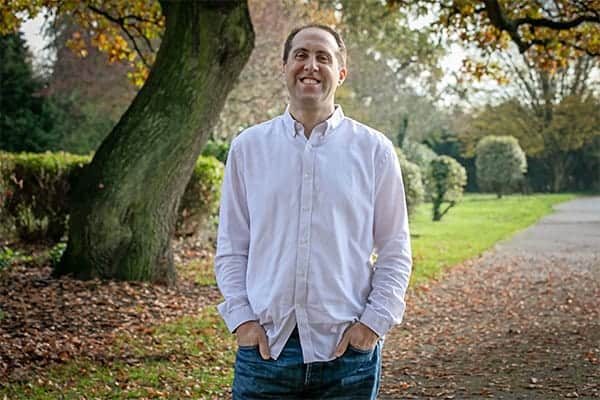
Starting a freelance consulting business during a pandemic
Posted on 28th April 2021 by Katherine Ducie
As part of our Meet The Freelancer series of blogs, we interview many freelance professionals from a range of industries.
This month we meet London based Freelance Communications Consultant, Michael Rosen, of Soundbite Communications.
Starting his own freelance business in January 2020, just as the Coronavirus pandemic emerged in the UK, Michael tells us how he has managed to make a success of his new business, despite the challenges of a global pandemic and a fragile economy.
For the last 20 years, Michael has worked in corporate communications, PR and media relations. Initially, Michael started his career in the charity sector working on PR and stakeholder communications before moving into the professional services sector.
Prior to going freelance, Michael spent five years working as Director of Communications at a Business Consultancy firm in central London.
While you may presume that going freelance over the last year, as many businesses have closed their doors, wouldn’t be great timing, if you have enough passion and are willing to work through the challenges, now can be as good a time as any to pursue your ambitions.
From a corporate career to freelance freedom, in this article Michael shares:
- His reasons for going freelance
- How finding new freelance work during the pandemic has been
- How he feels in hindsight about going freelance when he did
- The best thing about being a freelancer
- Key tips for going freelance during economic uncertainty
Reasons for going freelance
Explaining why he decided to leave his corporate career behind in favour of being freelance, Michael says: “I had a good time at the consulting firm I was at. I worked with a great bunch of people and it was really enjoyable, but I got to the point in my career where I felt that I needed a challenge and wanted a change.”
“I had itchy feet to do my own thing and thought now is as good a time as any to set up on my own.”
“I really enjoy working with people and helping them promote their activities and tell their side of the story to clients and customers and I felt I could do this for myself.”
“The corporate environment takes you to a certain level, but at some point you want to branch out of yourself and work with a range of clients and develop a different skill set.”
Sourcing new freelance clients amid a pandemic
Explaining how finding work has been over the last year of lockdowns, Michael says: “I started in January from a very low base so there wasn’t really a shift in the amount of work that was available come the first lockdown. It’s just that it became even harder to get the meetings and reach out to the people I wanted to, because everyone was so uncertain about what would be happening.”
“Budgets had been cut and projects had been put on pause so things that you were hoping would materialise didn’t or I’m still waiting to hear back from them.”
“The uncertainty meant that people weren’t willing to take the risks or invest in the projects they had previously planned on doing so that made things harder.”
Despite the hardship of tight budgets and slashed projects, Michael has still managed to secure projects with some well-established organisations in the property, financial services and legal industries. He says: “From when I started in February, I certainly had a nice amount of work. It’s not been as much as I wanted it to have been but at the same time it’s not been nothing.”
“I’ve worked on some really lovely projects with some great people and it’s just a question now of developing that so that it becomes more constant and I begin to see the flow of work being more reliable over the coming months.”
In hindsight, do you regret going freelance when you did?
Michael says: “The timing could’ve been better, but I don’t regret it at all. I felt that I had come to the natural conclusion of my corporate role.”
“I’m not alone and everybody’s had their challenges this year. I’m more encouraged that if I can make a go of it this year, in all years, then how much more so can I make a go of it hopefully when things are more positive and calmer, after the pandemic.”
“I’ve enjoyed working for myself, the variety and having the ability to meet new people and get involved in lots of different projects. I’m looking forward to being able to develop this further and take it in a direction that I really want to take it in for the next couple of years.”
What’s the best thing about being a freelancer?
Michael says: “I enjoy the fact that I can control my career and control my own working day. I’m the master of my own destiny, in terms of my career.”
“I have a choice about what work I want to take on and the sort of clients I want to work with and that is really very rewarding.”
“The fact that I don’t have to worry too much about corporate politics and the day-to-day company life is something that’s definitely an advantage also, but mostly it’s the fact that I can determine which projects I want to work on and what sort of clients I want to work with.”
Michael’s key tips for going freelance during economic uncertainty
Network
Michael says: “Network hard and be confident in what you’re doing because people will want to help.”
“One of the best things I’ve done is I’ve reached out and networked with a lot of people that hadn’t previously been in my network and that’s because people have put me in touch with them.”
“People want to help you and I’ve had a lot of joy from just approaching people and asking, ‘please can you take 10 or 20 minutes of your time and talk to me about what you do’.”
“Not selling myself but just trying to understand what they do and asking if they know of anybody else I should speak to that can talk to me about what they do and how I can learn from them.”
“Approach people and be confident in what you are asking them about.”
Be very clear on what your service and proposition is.
Michael says: “It took me a good few months, or even longer. I’m still trying to get it clear in my own mind, what is it that I offer that’s different that I can really add value in.”
“Why do people want to hire me? They’re hiring me so they need to be sure that I can solve their problems.”
“It’s really important to be clear on what your proposition is and communicate that effectively to people, because if you’re not clear then they won’t be clear.”
Believe in your abilities
Michael says: “Something I’ve had to deal with, and have realised a lot of people do too, is impostor syndrome.”
“You’re constantly thinking the work you produce is not going to be at the right level and it’s even harder in things like copywriting and communications where the work you produce is very subjective, so you’re often second guessing what you’re doing and whether it’s good enough.”
“I’ve had to work hard to not doubt myself. It’s definitely something that people have to think about – how they get confident with the work they’re producing and really focus on what they’re good at.”
Take on work that is within your comfort zone
Michael says: “I’ve taken on jobs over the past year where I haven’t quite been in my comfort zone and it’s been harder because I’ve been struggling to get it done and I’ve been constantly worrying about the output that I’m delivering for the client.”
“Don’t take on the jobs where you’re not quite as confident because ultimately that’s detrimental – to do work that you don’t enjoy.”
“Focus on what you are good at because that’s how you’re going to develop your business, skillset and confidence.”
“What is the area you can add value in? Is it in a specific industry that you have a lot of skill in or is it certain journalists that you’ve got a great relationship with? You want people to know you for having a strong skillset so focus on developing those skills and becoming well regarded for those skills specifically.”
For more information on how you can stay protected with Freelance Insurance, call our friendly team of experts today on 0333 321 1403, or click to get a quick online quote in minutes!
CLICK HERE FOR A QUICK ONLINE BUSINESS INSURANCE QUOTE
Related articles:
Things to consider before starting a consultancy business
Why the need for consultants has never been greater
Read more of our Meet The Freelancer series here.



